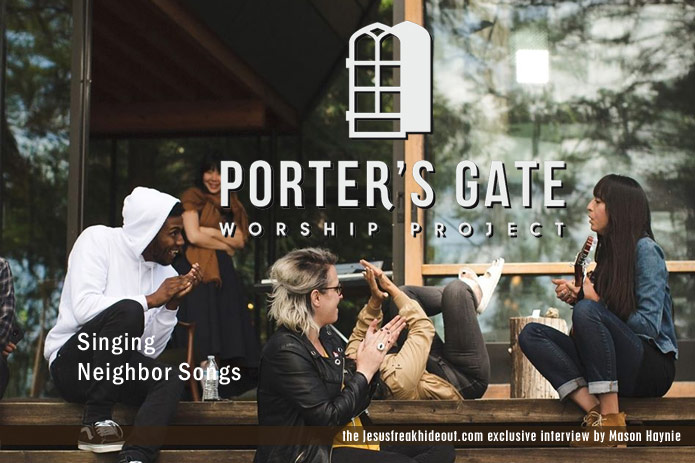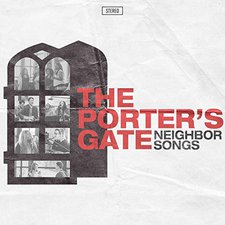
Isaac Wardell: I thought you were going to have easier questions than that. *both laugh* Starting with that "metaphor replacement surgery" idea...every week, I put together the worship service here at my church just like many other worship leaders and pastors across the country. One of the things that I think about all the time as I'm preparing is the story of people's lives that they walk into church with on Sunday. Everyone comes in with their own set of metaphors that animate their lives. With the Neighbor Songs record, I think there are some easy, low-hanging fruit answers to that question. The conversation about "Who is my neighbor?" is maybe the defining question of our age right now, particularly in light of the political discourse going on in America. It is absolutely the case that candidates like Donald Trump in 2016 made entire political campaigns out of asking "Who is not my neighbor?" Speaking of metaphors, you have this powerful, emotionally compelling image of a wall that's been at the center of American dialogue the past few years. It's interesting that very little wall has been built, but it's not about that. It's about the metaphor, the image, the idea that we are safer with the wall up. This is about using a metaphor to gather people around a cause. That's one of the metaphors that needs replacing. Maybe a subtler but just as powerful one deals with the idea that living in America in the 21st Century across the street or hallway with people who are very different...there is a lot of cultural complexity present. The image people live out of is that at the end of the day, somebody is going to win and somebody is going to lose in this culture war. We encounter a completely different metaphor with Jesus. Counterintuitively, instead of protecting the things that we have, we are to actually take everything we have and give it away. Taking our lives and pouring them out, not saving them. That is a really different way to think about relating to our neighbors across lines of difference. I think maybe that metaphor replacement is close to the center of the record.

Isaac I think I want to clarify that language of identity crisis. Really specifically, the American white evangelical church is experiencing an identity crisis. I don't think it's as true in the black church, the Roman Catholic church, the Messianic Jewish church...and I'm not speaking to this as an outsider. I grew up in the white evangelical church and am employed by one, depending on your definition of the term. I find that identity crisis to be closely related to theology of power. Many evangelical churches have had financial, sociological, and even legislative power, and now, evangelicals are looking at a future where this may not be the case. A lot of the crisis, pain, fear, and anger comes from that in particular. And one of the songs that's central to the record is the meditation on Isaiah 43 called "Nothing To Fear." What came up over and over again at our last gathering was this question of "why is it that my church resists neighbors so strongly?" The answer that continues to come back is fear. This song has that language that there is nothing to fear, for God is with us always. So yes, I do think that the white evangelical church is going through an identity crisis that has to do with the church reimagining itself not as a politically empowered church, but as one that can better identify with the disempowered. And that process is not going to be without some pain.
Isaac: Yeah, that's a great question, and we've asked that question several times. Sorry to say, but the answer is kind of yes and no. A strong "no" in the sense that we actually had the next six records mapped out back in 2016. So this record was next in line regardless. But the answer is also "yes" because, as far as I'm concerned, theology is when we take the questions of our time and bring them to the Scriptures to see what they say. So, for that reason, of course this record responds to the moment that we live in. In some cases, that's very simple; on this record, we have three Scripture songs. Some other songs are a little more complex, but they still take what the Bible has to say and interact in a meaningful way with our neighbors' questions.
Isaac: Yeah, I don't know, Mason. What you're referring to baffles me. When we find ourselves having to do some gymnastics to get around what the Scriptures say, I think we're in dangerous waters. For someone to question an emphasis on love...it doesn't take much interpretive work to see what Jesus said the greatest commandment is. I think that scenario reveals an idolatry or a suspicion of what Jesus is saying. To the extent that an emphasis on love is controversial, I think we have to see what else it is that we are putting on the thrones of our lives if it's not obeying Jesus' call to love.
Isaac: There is a critique out there that might be true for many of us. We can congratulate ourselves for recognizing that Jesus says the right things, but actually doing what He says...we can easily find an excuse against that.
Isaac: Well, to be super honest with you, we didn't pick that to be the first one on the record. *laughs* We originally picked the last song on the record to be first. We thought it would be great for "En Comunidad" to be the central theme, but since that song is in Spanish, the label recognized that many people would be confused by not knowing what is being said. So the songs got switched, but they're both Scripture songs that undergird how the center of our lives should not be burdened by an obligation to love, but by a joyfulness of living in community. There are songs of lament on the record, but we liked the idea of starting and ending it with joy.
Isaac: Absolutely. Both of these records involved a lot of collaboration, but because I have this impulse to control, Work Songs was run with a much heavier hand. There are positives to that, but at the end of that process, I debriefed with a lot of the collaborators, and many of them felt like they had a lot more to give. So this time around, I held things together administratively, but I stepped back creatively. While that's a humbling process, I think the contributors felt more seen and heard, and listeners are hearing more of what the Church sounds like, not just what Isaac sounds like.
Isaac: Yeah, the first person that comes to my mind is Diana Gameros. She sings several songs and plays guitar on the record. She's a Mexican-American singer, originally from Juárez, and she has an extraordinary, compassionate voice and perspective from her experience living undocumented in America until very recently. Her contributions as a songwriter and performer were really essential, and her presence is some of what gives this record its particular sound as opposed to the last one.
 Sanctus Real Share Encouraging New Single, "Steady" Sanctus Real Share Encouraging New Single, "Steady"Sat, 14 Feb 2026 14:31:00 EST |
 B. Cooper Drops "L2ML (feat. Steve Means, Brandi Grimsley)" B. Cooper Drops "L2ML (feat. Steve Means, Brandi Grimsley)"Sat, 14 Feb 2026 14:20:00 EST |
 Pat Barrett Releases "Break Open" From Upcoming Live Album Pat Barrett Releases "Break Open" From Upcoming Live AlbumFri, 13 Feb 2026 19:14:00 EST |
 Trip Lee Debuts BRAG Worship EP, FOR YOUR GLORY Trip Lee Debuts BRAG Worship EP, FOR YOUR GLORYFri, 13 Feb 2026 18:55:00 EST |
 Passion Announces March 6th New Album, "Just That Good" Passion Announces March 6th New Album, "Just That Good"Fri, 13 Feb 2026 18:47:00 EST |
 KB Releases Genre-Bending New Single, "BLOOD 2" KB Releases Genre-Bending New Single, "BLOOD 2"Fri, 13 Feb 2026 18:42:00 EST |
 Les and Joyce Carlsen Declare "He's God" with New Rock Single Les and Joyce Carlsen Declare "He's God" with New Rock SingleFri, 13 Feb 2026 18:30:00 EST |
 Click here All News Headlines |
Click here All News Headlines |